Key takeaways:
- Ethical fishing practices emphasize sustainability and respect for aquatic life, highlighting the importance of responsible choices to preserve ecosystems.
- Animal welfare is crucial for biodiversity; protecting wildlife ensures healthy waterways and resources for future generations.
- Engaging education revolves around hands-on experiences, real-life scenarios, and fostering empathy through discussions about fishing ethics.
- Promoting responsible fishing habits involves understanding the consequences of actions, emphasizing catch-and-release practices, and inspiring stewardship through success stories.
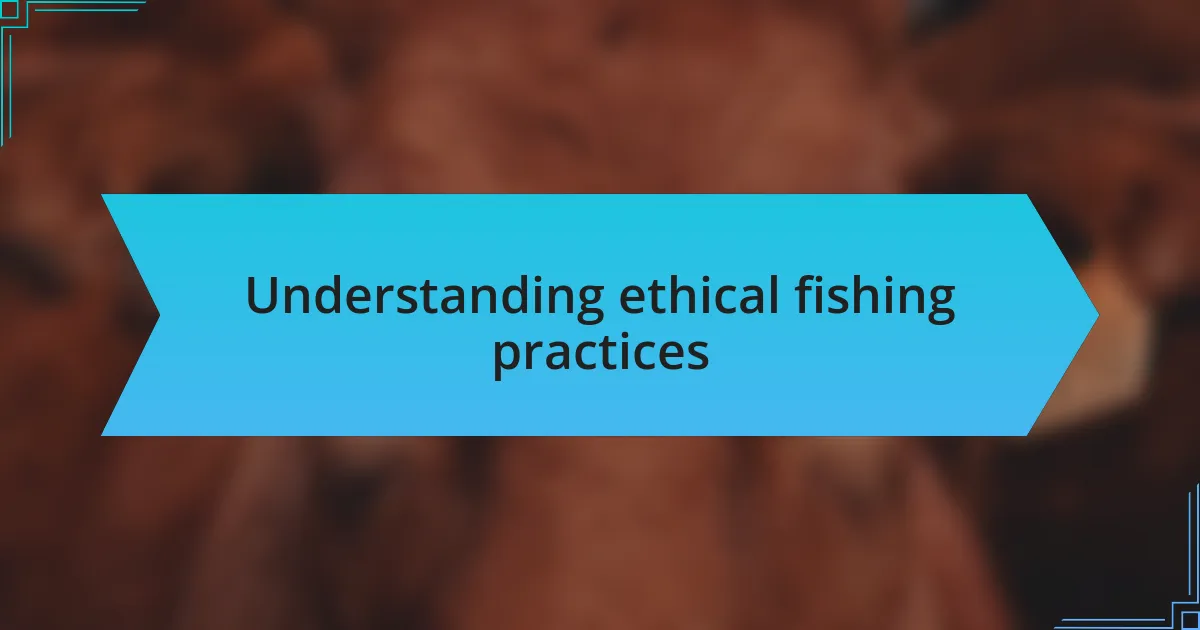
Understanding ethical fishing practices
Ethical fishing practices are grounded in the principles of sustainability and respect for aquatic life. When I first started fishing, I was oblivious to the ecological balance that our waterways require. Thinking back, I wish someone had guided me on how important it was to understand the habitats we were intruding upon.
These practices often involve using gear that minimizes harm and selecting non-endangered species. I remember a day spent fishing with friends where I learned the difference between catch-and-release and keeping your haul. It was enlightening to realize that responsible choices can have a direct impact on preserving fish populations and their ecosystems.
Have you ever considered how your fishing methods affect not just the fish, but the entire aquatic environment? I’ve seen firsthand the devastation caused by overfishing, where once-thriving spots become barren. This realization drives home the importance of implementing ethical techniques, prioritizing the health of our oceans for future generations.
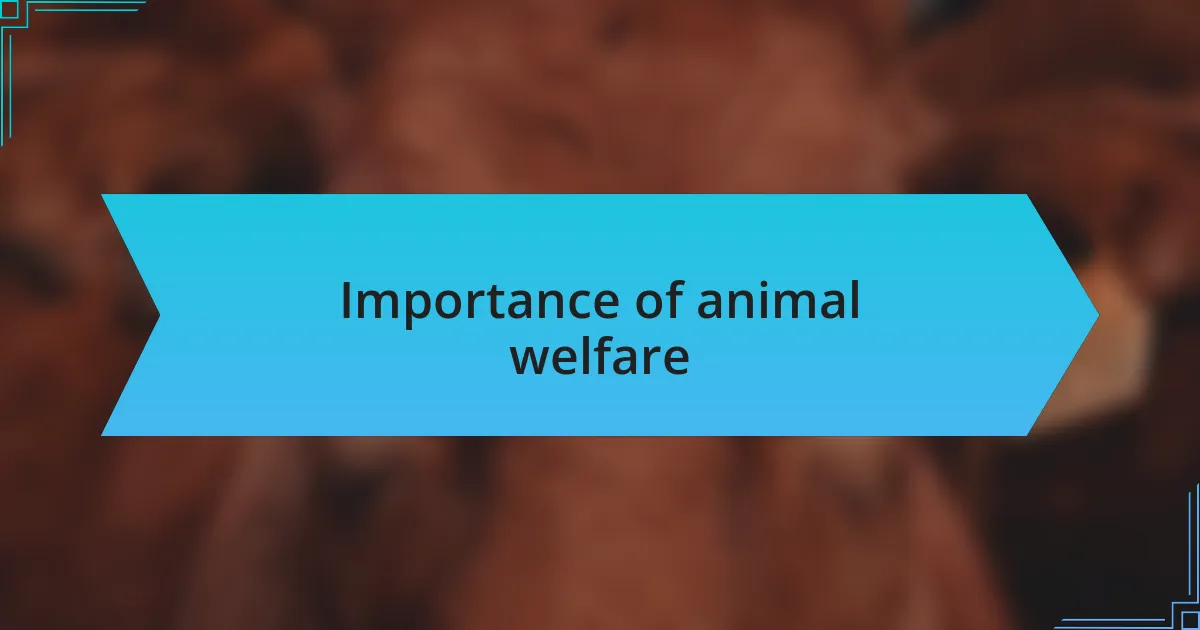
Importance of animal welfare
Protecting the welfare of animals is essential for maintaining biodiversity and ecological balance. I often reflect on the times I’ve stumbled upon tangled lines and discarded nets while fishing. The sight of struggling wildlife was a stark reminder of our responsibility to ensure their well-being and to create an environment where all creatures can thrive.
Every species plays a unique role in its ecosystem. In my experience, observing different fish species coexisting harmoniously reinforces the idea that animal welfare is not just a concern, but a necessity for healthy waterways. When we prioritize their welfare, we indirectly safeguard our own future, ensuring that the resources we rely on remain abundant.
Have you ever considered the emotional impact that our interactions with wildlife can have on our sense of humanity? During a recent fishing trip, I encountered a young heron that appeared unfazed by my presence. Watching it hunt with precision stirred in me a deep appreciation for the delicate balance of nature. This moment underscored the importance of recognizing the value of animal welfare, reminding me that our actions can either contribute to or diminish the natural beauty we often take for granted.
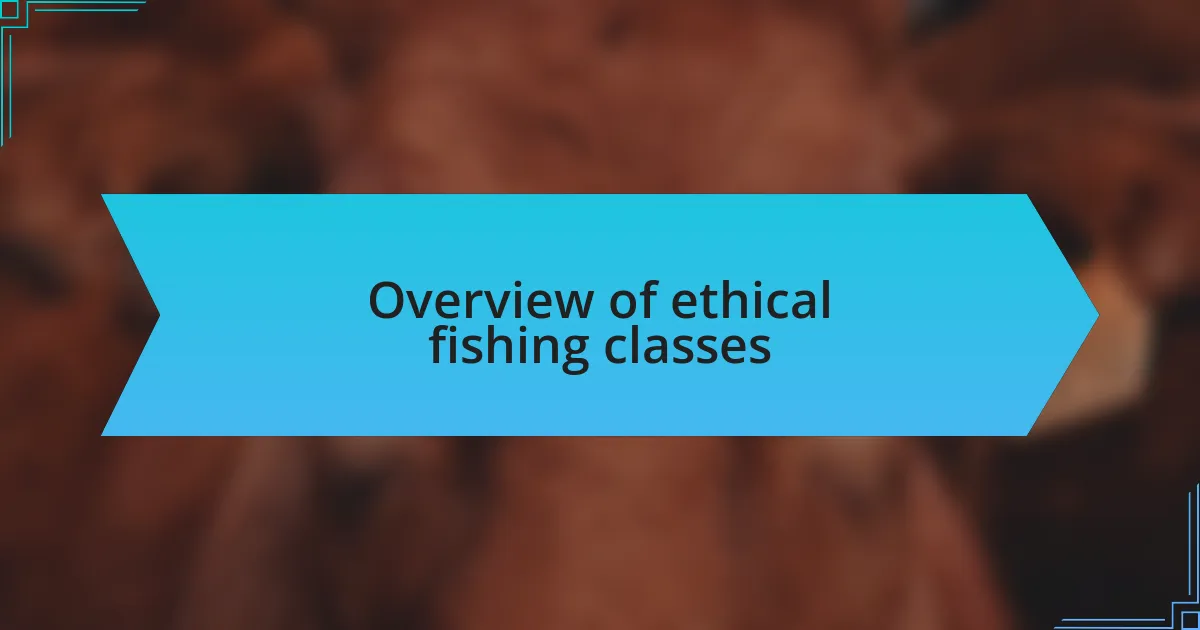
Overview of ethical fishing classes
Ethical fishing classes focus on educating anglers about responsible practices that minimize harm to aquatic life and ecosystems. When I first participated in one of these classes, I felt an overwhelming sense of camaraderie with fellow anglers who shared a passion for preserving our waters. The discussions often sparked healthy debates about conservation methods and the importance of respecting fishing quotas, ensuring everyone left with a shared commitment to better practices.
These classes delve into various aspects of ethical fishing, such as proper catch-and-release techniques and understanding the impact of fishing on local fish populations. I remember a particular session where an instructor demonstrated the right way to handle a fish to maximize its chance of survival after being released. This hands-on experience was eye-opening; I never realized how crucial it was to support fish recovery with correct techniques. Have you ever thought about how the small adjustments we make can lead to a significant positive change?
Moreover, ethical fishing classes foster a deeper connection between individuals and nature. One striking memory I hold is from a workshop near a pristine lake. As we cast our lines, the instructor encouraged us to appreciate the natural beauty around us. That moment shifted my perspective on fishing; it’s not just about catching fish, but rather about respecting the environment that sustains them. Engaging with nature in this way has transformed my approach, reminding me that every fishing trip can be an opportunity to practice mindfulness and environmental stewardship.
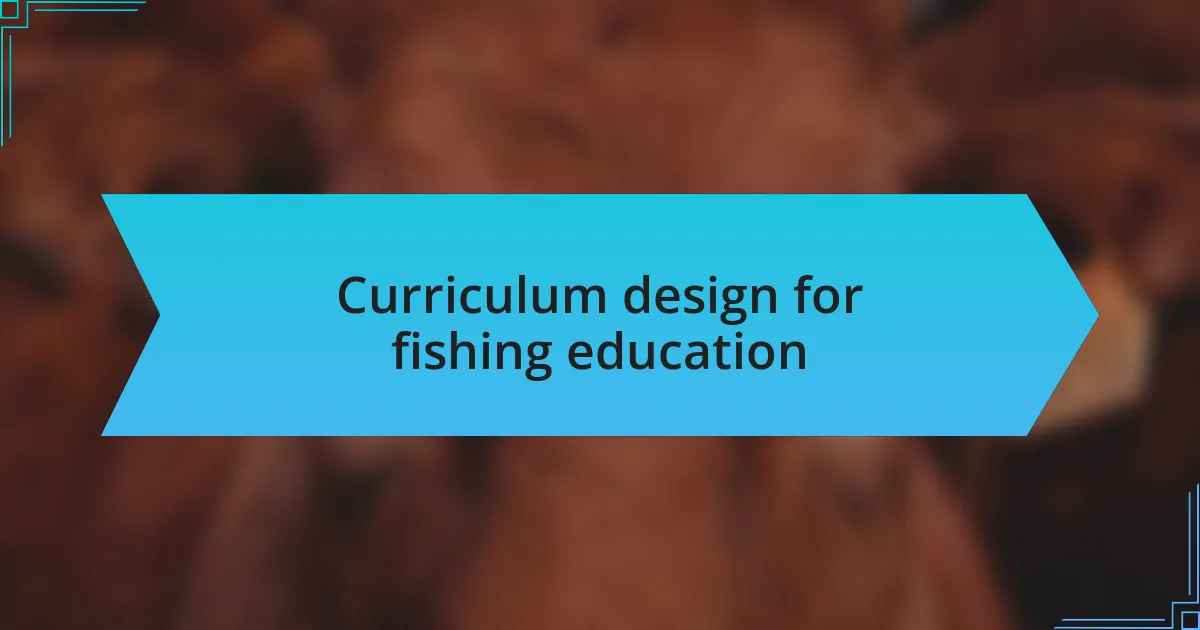
Curriculum design for fishing education
Curriculum design for fishing education is crucial for effectively instilling ethical practices among participants. I remember a particular workshop where the curriculum included both classroom instruction and outdoor experiences. This blend of theory and practice allowed us to appreciate the importance of sustainable fishing from both scientific and emotional perspectives. How can we truly understand the delicate balance of aquatic ecosystems without directly engaging with them?
To truly resonate with learners, it’s essential to incorporate real-life scenarios into the curriculum. In one session, we analyzed case studies of overfished areas and heard firsthand accounts from local fishery managers about their struggles. This not only highlighted the consequences of neglecting ethical practices but also sparked deep conversations among us. Have you ever reflected on how our choices in fishing can directly impact communities that rely on these resources?
An effective curriculum also encourages peer-to-peer learning and collaboration. I recall a group activity where we developed strategies for promoting sustainable fishing in our local communities. Sharing insights and ideas with fellow participants was empowering; it felt like we were collectively forging a path toward positive change. What if every fishing class could become a breeding ground for passionate advocates for our waters?
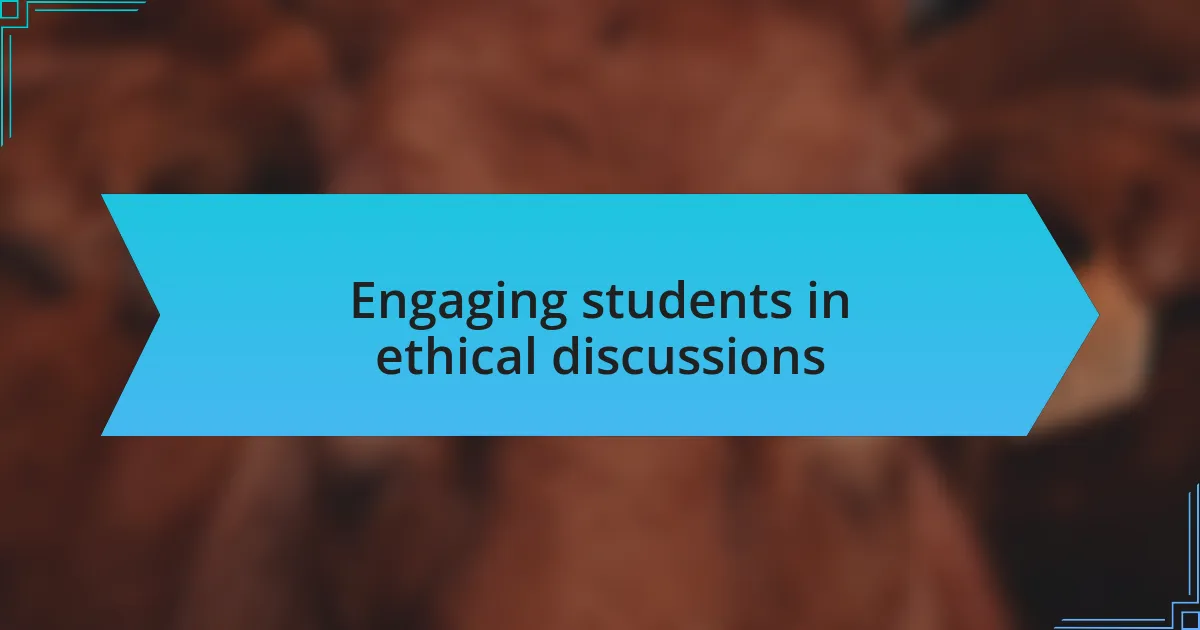
Engaging students in ethical discussions
To engage students in ethical discussions, I find that starting with thought-provoking questions can ignite their curiosity. In one session, we explored the idea of “what if fishing regulations didn’t exist?” The ensuing debate was electric, as students passionately articulated their views on conservation versus community needs. This kind of inquiry not only stimulates dialogue but also encourages students to reflect on their values and the impact of their choices.
Another approach I found effective was integrating role-playing activities into the discourse. During one class, we simulated a town hall meeting where participants played various roles—like anglers, conservationists, and local business owners. This exercise allowed everyone to step into different shoes, fostering empathy and a deeper understanding of the complex relationships within our aquatic ecosystems. I can’t help but wonder how many more ethical fishers we could create if we consistently practiced seeing through others’ eyes.
Engaging students also means creating a safe space for sharing personal experiences related to fishing ethics. I remember when a student shared their family’s fishing traditions and the lessons learned about respecting the environment. This moment not only deepened connections among us but also illustrated the personal stakes involved in ethical fishing. How often do we overlook the stories that shape our understanding of sustainability? By allowing such narratives to flourish, we cultivate our shared commitment to protecting our waters.
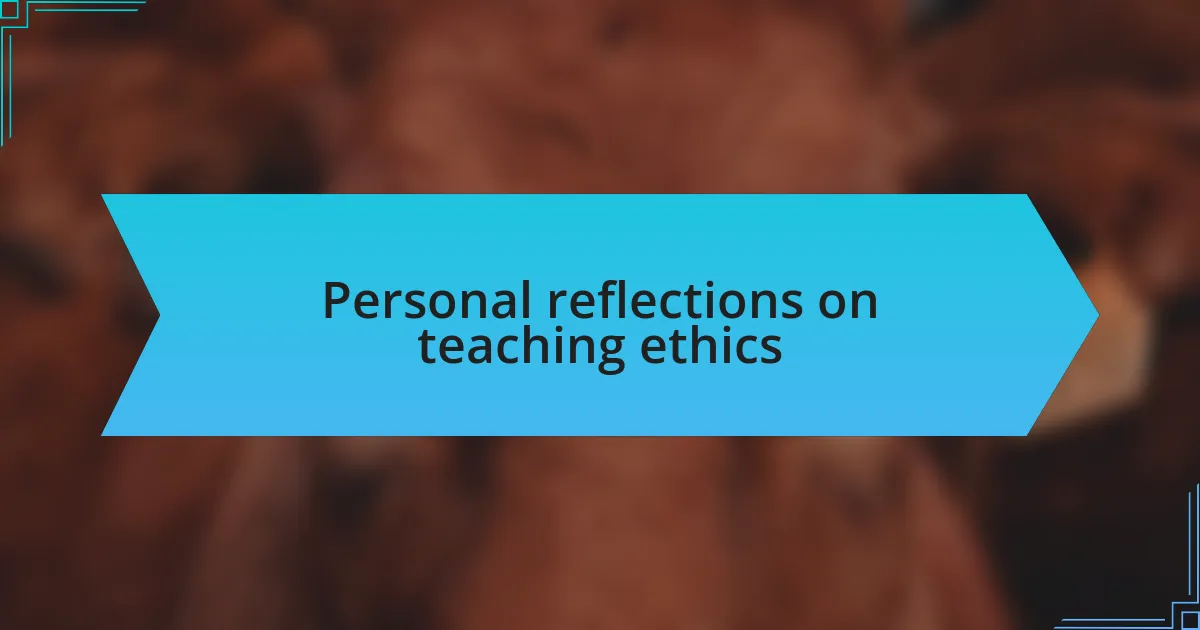
Personal reflections on teaching ethics
Teaching ethics, especially in the context of fishing, often leads me to reflect on my own journey. I recall my first fishing trip, where I unknowingly caught a spawning fish. It struck me then, and even more now, how little we sometimes consider the broader implications of our actions. As I share this experience with students, I ask them to think: How can our choices today impact the ecosystems we cherish tomorrow? This question isn’t just theoretical; it’s a call to action.
In another instance, I once had a student express frustration about regulations. They felt it restricted their freedom. However, when I guided them through a discussion on the long-term benefits of those regulations—like fish populations recovering—there was a noticeable shift. It made me appreciate how using real-life examples can bridge the gap between perceived inconvenience and genuine understanding. I often wonder: is it enough to teach ethics, or should we aim to instill a passion for conservation in our students?
One day, during a class discussion on ethical fishing practices, a student candidly shared how fishing with their grandparent taught them respect for nature. The emotion in their voice resonated deeply with all of us. Moments like this reinforce my belief that teaching ethics is not merely about imparting knowledge; it’s about cultivating a sense of responsibility and connection. How profound is it to think that our actions may one day influence the next generation of anglers?
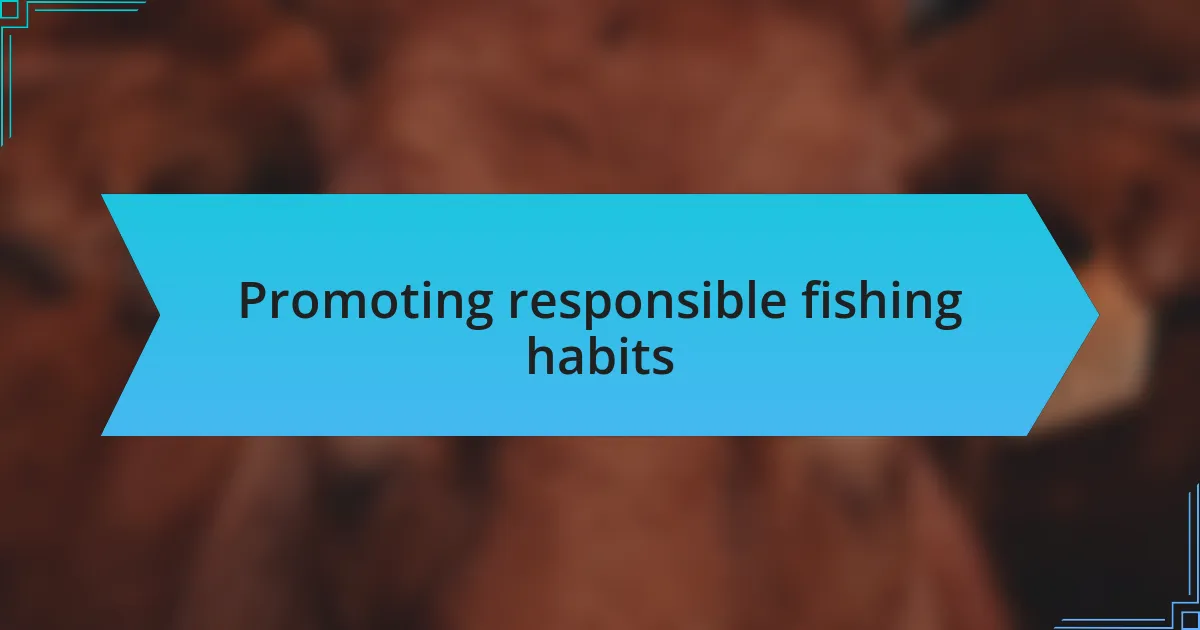
Promoting responsible fishing habits
Promoting responsible fishing habits starts with understanding the impact of our actions on aquatic ecosystems. I vividly remember a day on the water when I witnessed a fellow angler carelessly discard a plastic bottle. As the bottle drifted away, I felt a mix of frustration and sadness; I wondered aloud, how many fish and birds are affected by such thoughtlessness? This served as a powerful reminder that each of us holds a piece of the responsibility to protect our waterways.
In the classroom, I often emphasize the importance of catch-and-release practices. I recall a meaningful moment with a group of teenagers who were initially skeptical about letting fish go. After discussing the science behind maintaining healthy fish populations, their mindset shifted significantly. It was heartwarming to see them embrace the idea that their choices today can shape the fishing experiences of future generations. Who wouldn’t want to be a steward of our oceans rather than just a participant?
Furthermore, I’ve discovered that sharing stories about local conservation success can inspire action. One time, I introduced my students to a fisherman who had helped restore a local stream. His passion was infectious, and I could see the spark in my students’ eyes. They were beginning to understand that responsible fishing isn’t just about regulations; it’s about forming a lifelong partnership with nature. Isn’t it amazing how the right stories can ignite a sense of purpose?